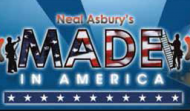
Proposing that innovation is in the DNA of America, Neal Asbury opened his nationally syndicated “Neal Asbury’s Made in America” show on Radio America (now on 47 stations) by proposing that if America could innovate itself out of the Great Depression, we can innovate ourselves out of the current economic mess.
“You might be surprised to learn that statistics show that the 1930s were one of the most innovative decades of the twentieth century in terms of innovation. The Laundromat, the car radio, the supermarket, the dry electric shaver were all invented during this period. We could usher in a new era of innovation, but we must first remove the excessive regulations that keep our people from creating new products and jobs,” proposed Neal.
Made in America welcomed back Carl J. Schramm, an internationally recognized leader in entrepreneurship, innovation and economic growth, and who is on the faculty of Syracuse University.
“I teach a class on innovation, and it’s amazing how many people think that we’ve invented so many products that there’s nothing more to invent. People aren’t innovating as much anymore because there are so many regulatory hurdles that the threshold to innovation is too big to surmount,” suggested Schramm, who added that many of the patents being granted are just slight improvements in existing technology or products spurred by the need for universities to demonstrate their ability to amass patents.
Schramm also attributes the perceived lack of innovation to the drop in people employed in manufacturing where many new ideas percolate. He proposed that innovation is linear and incremental, and grows out of problem solving that arises during manufacturing. He suggests that when people aren’t working, linear ideas don’t happen, and the patents that come with it.
Co-host Dr. Rich Roffman reminded listeners of JFK’s famous speech in connection with his resolve for NASA to go to the moon. He said, “We don’t choose to do things because they are easy, but because they are hard.”
Schramm agreed, and added that if we can’t change the context of our economy and create more jobs, innovation will continue to suffer.
“There’s too much risk, too much regulation and too few new jobs. It’s taking the spirit of innovation out of our population,” concluded Schramm.
Neal and Dr. Roffman segued to a discussion on Obamacare and its less than auspicious debut.
“Obamacare’s introduction was a disaster, and yet Obama compares the national computer problems for enrollment to glitches when Apple introduces a new product. That’s really not a fair comparison because if you don’t buy an Apple product, you don’t get fined or go to jail. I’ve hear that in Connecticut, a big blue state, less than one percent of people who tried to enroll successfully signed up,” noted Dr. Roffman.
Dr. Roffman proposed that people will be in for a rude surprise when they find that their insurance rates for some plans will be about $600 per month and will carry a deductible of about $14,000. What’s worse is that failure to make payments could result in a fine, the loss of your driver’s license, a lien on your house, or mandatory deductions from your paycheck.
“The nastiest surprise for people in 10 states is that they may find that their current insurance carrier isn’t participating in the exchange program, which will leave them without insurance or a doctor,” added Dr. Roffman.
Neal reminded listeners that even before the October 1 introduction of Obamacare, workers were finding their hours were reduced to 30 per week so that employers would be exempt from paying Obamacare.
Made in America’s next guest was Ryan Young, from the Competitive Enterprise Institute, who revealed that federal regulations cost the American economy $1.8 trillion a year.
“Last year 3,700 regulations were issued, but the Office of Management and Budget (OMB) was only able to review one percent of them. There’s a big transparency problem. No one is really tracking the flood of regulations,” said Young.
Young maintained that according to a recent study, if the regulatory environment today was the same as it was in 1949, the average worth of every American would triple from $40,000 to $120,000.
The final guest on Made in America was Robert Kreipke, Ford Motor Company’s Corporate Historian and Creative Manager, who is spearheading the 100 year anniversary of the invention of the moving assembly line, pioneered by Henry Ford.
“There’s no question that Henry Ford’s greatest contribution to American car manufacturing was the moving assembly line. But people don’t appreciate that it also led to a way to save time and money so that the cost of the car could go down while employees made more money. It really helped create the middle class worker,” said Kreipke.
Kreipke revealed that Henry Ford would walk the factory floor and actually count how many footsteps his workers would make to assemble a car. He realized that if he could reduce the number footsteps required to add a part so workers could be more stationary, workers would be more productive. So in 1913, he created the process whereby the parts came to the worker, instead of forcing the worker to come to the part.
“The moving assembly line not only standardized manufacturing, but America’s workforce,” concluded Kreipke.
Neal and co-host Dr. Rich Roffman concluded the show by returning to the topic of cronyism and its impact on enriching friends of the White House.
“When you see a program with the costs of Obamacare, you can bet that there’s an opportunity for friends of Obama to prosper. One such friend is the nonprofit Seedco, a community-organizing group that snagged lucrative multimillion-dollar navigator contracts for Obamacare in Georgia, Maryland, Tennessee, and New York. What makes this story even more atrocious is that Seedco has been sued by the federal government for fraud, and now they’ll have access to potential enrollees’ income levels, birthdates, addresses, eligibility for government assistance, Social Security numbers, and intensely personal medical information,” revealed Dr. Roffman, who added that the real slap in the face came from a Seedco representative who suggested that Seedco will bring its “experience and integrity to Obamacare.”
Each week Neal Asbury’s Made in America provides Neal’s insights into the week’s top news stories and their impact on the worlds of entrepreneurship, small business ownership and the overall economy. Neal’s analysis, together with co-host Dr. Richard Roffman, a veteran 30-year publisher with extensive domestic and international experience, takes a non-biased approach based on real life experience in business as an American manufacturer and exporter. Made in America airs nationally each Saturday from 7-8:00 PM on Radio America. Link to Made in America at http://www.nealasburysmadeinamerica.com.
OCT



